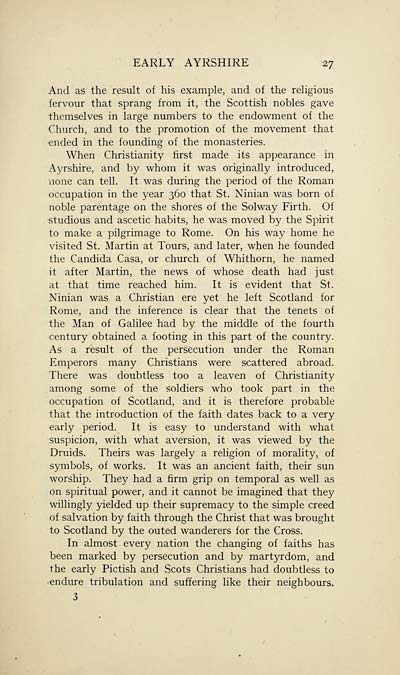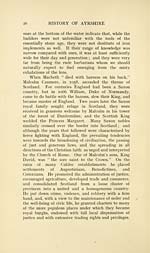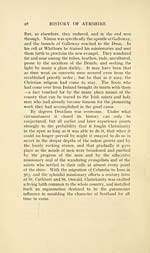Download files
Complete book:
Individual page:
Thumbnail gallery: Grid view | List view

EARLY AYRSHIRE 27
And as the result of his example, and of the religious
fervour that sprang from it, the Scottish nobles gave
themselves in large numbers to the endowment of the
Church, and to the promotion of the movement that
ended in the founding of the monasteries.
When Christianity first made its appearance in
Ayrshire, and by whom it was originally introduced,
none can tell. It was during the period of the Roman
occupation in the year 360 that St. Ninian was born of
noble parentage on the shores of the Solway Firth. Of
studious and ascetic habits, he was moved by the Spirit
to make a pilgrimage to Rome. On his way home he
visited St. Martin at Tours, and later, when he founded
the Candida Casa, or church of Whithorn, he named
it after Martin, the news of whose death had just
at that time reached him. It is evident that St.
Ninian was a Christian ere yet he left Scotland for
Rome, and the inference is clear that the tenets of
the Man of Galilee had by the middle of the fourth
century obtained a footing in this part of the country.
As a result of the persecution under the Roman
Emperors many Christians were scattered abroad.
There was doubtless too a leaven of Christianity
among some of the soldiers who took part in the
occupation of Scotland, and it is therefore probable
that the introduction of the faith dates back to a very
early period. It is easy to understand with what
suspicion, with what aversion, it was viewed by the
Druids. Theirs was largely a religion of morality, of
symbols, of works. It was an ancient faith, their sun
worship. They had a firm grip on temporal as well as
on spiritual power, and it cannot be imagined that they
willingly yielded up their supremacy to the simple creed
of salvation by faith through the Christ that was brought
to Scotland by the outed wanderers for the Cross.
In almost every nation the changing of faiths has
been marked by persecution and by martyrdom, and
the early Pictish and Scots Christians had doubtless to
endure tribulation and suffering like their neighbours.
3
And as the result of his example, and of the religious
fervour that sprang from it, the Scottish nobles gave
themselves in large numbers to the endowment of the
Church, and to the promotion of the movement that
ended in the founding of the monasteries.
When Christianity first made its appearance in
Ayrshire, and by whom it was originally introduced,
none can tell. It was during the period of the Roman
occupation in the year 360 that St. Ninian was born of
noble parentage on the shores of the Solway Firth. Of
studious and ascetic habits, he was moved by the Spirit
to make a pilgrimage to Rome. On his way home he
visited St. Martin at Tours, and later, when he founded
the Candida Casa, or church of Whithorn, he named
it after Martin, the news of whose death had just
at that time reached him. It is evident that St.
Ninian was a Christian ere yet he left Scotland for
Rome, and the inference is clear that the tenets of
the Man of Galilee had by the middle of the fourth
century obtained a footing in this part of the country.
As a result of the persecution under the Roman
Emperors many Christians were scattered abroad.
There was doubtless too a leaven of Christianity
among some of the soldiers who took part in the
occupation of Scotland, and it is therefore probable
that the introduction of the faith dates back to a very
early period. It is easy to understand with what
suspicion, with what aversion, it was viewed by the
Druids. Theirs was largely a religion of morality, of
symbols, of works. It was an ancient faith, their sun
worship. They had a firm grip on temporal as well as
on spiritual power, and it cannot be imagined that they
willingly yielded up their supremacy to the simple creed
of salvation by faith through the Christ that was brought
to Scotland by the outed wanderers for the Cross.
In almost every nation the changing of faiths has
been marked by persecution and by martyrdom, and
the early Pictish and Scots Christians had doubtless to
endure tribulation and suffering like their neighbours.
3
Set display mode to:
![]() Universal Viewer |
Universal Viewer | ![]() Mirador |
Large image | Transcription
Mirador |
Large image | Transcription
Images and transcriptions on this page, including medium image downloads, may be used under the Creative Commons Attribution 4.0 International Licence unless otherwise stated. ![]()
| Histories of Scottish families > Ayrshire > Volume 1 > (37) Page 27 |
|---|
| Permanent URL | https://digital.nls.uk/95194730 |
|---|
| Attribution and copyright: |
|
|---|
| Description | A selection of almost 400 printed items relating to the history of Scottish families, mostly dating from the 19th and early 20th centuries. Includes memoirs, genealogies and clan histories, with a few produced by emigrant families. The earliest family history goes back to AD 916. |
|---|

